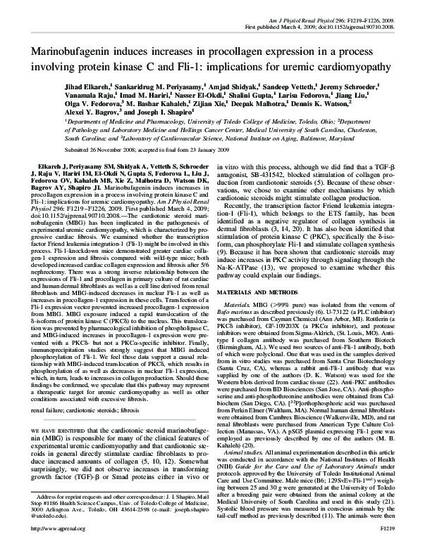
The cardiotonic steroid marinobufagenin (MBG) has been implicated in the pathogenesis of experimental uremic cardiomyopathy, which is characterized by progressive cardiac fibrosis. We examined whether the transcription factor Friend leukemia integration-1 (Fli-1) might be involved in this process. Fli-1-knockdown mice demonstrated greater cardiac collagen-1 expression and fibrosis compared with wild-type mice; both developed increased cardiac collagen expression and fibrosis after 5/6 nephrectomy. There was a strong inverse relationship between the expressions of Fli-1 and procollagen in primary culture of rat cardiac and human dermal fibroblasts as well as a cell line derived from renal fibroblasts and MBG-induced decreases in nuclear Fli-1 as well as increases in procollagen-1 expression in these cells. Transfection of a Fli-1 expression vector prevented increased procollagen-1 expression from MBG. MBG exposure induced a rapid translocation of the δ-isoform of protein kinase C (PKCδ) to the nucleus. This translocation was prevented by pharmacological inhibition of phospholipase C, and MBG-induced increases in procollagen-1 expression were prevented with a PKCδ- but not a PKCα-specific inhibitor. Finally, immunoprecipitation studies strongly suggest that MBG induced phosphorylation of Fli-1. We feel these data support a causal relationship with MBG-induced translocation of PKCδ, which results in phosphorylation of as well as decreases in nuclear Fli-1 expression, which, in turn, leads to increases in collagen production. Should these findings be confirmed, we speculate that this pathway may represent a therapeutic target for uremic cardiomyopathy as well as other conditions associated with excessive fibrosis.

The copy of record is available from the American Journal of Physiology at http://ajprenal.physiology.org/content/ajprenal/296/5/F1219.full.pdf. Copyright © 2009 American Physiological Society. DOI: 10.1152/ajprenal.90710.2008